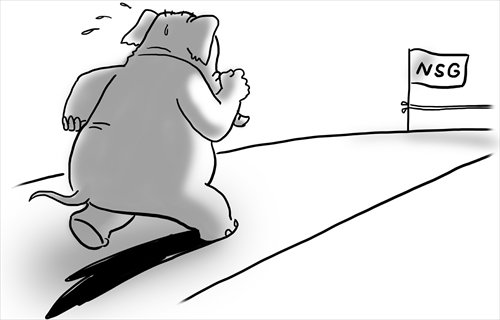China no barrier to India’s NSG membership

Illustration: Liu Rui /GT
The Nuclear Suppliers Group (NSG) plenary meeting started Monday and will end Friday in Seoul. In a bid to become a member of NSG, the Indian government has launched a diplomatic offensive and Indian President Pranab Mukherjee and Prime Minister Narendra Modi have embarked on foreign visits to win support from NSG member states.
The NSG was set up by a group of countries that have civil nuclear technology, equipment and material export capabilities. It aims to achieve nuclear non-proliferation by preventing civil nuclear technology and material from being used to develop nuclear weapons.
A country must meet four requirements to become a member of the NSG. It must have the capacity to export civil nuclear technologies; it must abide by the guidelines of the NSG; it must have signed the Treaty on the Non-Proliferation of Nuclear Weapons (NPT) or other regional non-proliferation treaties. It also needs to provide "overarching and integrated legislation prohibiting unlawful activities in relation to Weapons of Mass Destruction and their delivery systems."
As a nuclear power, India has acquired the ability to export civil nuclear technologies. The NSG allows member countries to export civil nuclear technology, equipment and material to India. India's struggle to enter the NSG is also aimed at joining the global civil nuclear market.
Despite not being an NSG member, India has been sticking to NSG guidelines and implementing rigorous export control policies to prevent nuclear proliferation. It also meets the last requirement and was admitted to membership of the Missile Technology Control Regime (MTCR) early this month.
The direct obstacle for India joining the NSG is that it has not signed the NPT or any other regional non-proliferation pact. The only exception for a non-NPT signatory is if it obtains consent from all NSG members. Countries such as Norway, New Zealand, South Africa and China all hold reservations about India's inclusion into the NSG. But some Indian media and scholars simply put the blame on China, accusing China of being hostile toward India, which misses the point.
India joining NSG does not harm China's own interests. India advocates nuclear non-proliferation and nuclear disarmament and commits itself to no-first-use of nuclear weapons as China does. It could also help enhance bilateral cooperation in civil nuclear energies. Measures that can boost mutual trust could be established among China, India and Pakistan, the three nuclear powers in Asia.
Is it that simple that as long as India signs the NPT, it can join NSG? The source of conflicts comes from the dilemma of such mechanisms in accepting both India and Pakistan. It is generally reckoned that countries that conducted nuclear tests before the UN General Assembly adopted the Comprehensive Nuclear-Test-Ban Treaty (CTBT) in 1996 are legitimate nuclear countries, while those that did so after the adoption of the CTBT are considered illegitimate.
India and Pakistan conducted nuclear tests in 1998, which were condemned by the international community, and the US, the EU and Japan all imposed harsh sanctions on the two countries. After the September 11 attacks, the sanctions were gradually lifted. The US even signed with India a Civil Nuclear Agreement and backs India's bid to join NSG. But the issue of the legitimacy of India's "nuclear status" has not been solved.
If India and Pakistan are allowed to join the NPT and adopt the CTBT, it will tarnish the authority of both. How can nuclear weapon development in other countries such as North Korea, Iran and Israel be dealt with?
If the US is sincere in supporting India's NSG membership, it should not just cast its eyes on India's nuclear market. It should solve India's "nuclear status" first so as to eradicate the contradictions between India and the existing international nuclear non-proliferation mechanism.
While India strives for NSG inclusion, it prevents Pakistan from joining by insisting on the latter's bad record of nuclear proliferation. Actually, the proliferation carried out by Pakistan was done by Abdul Qadeer Khan, Pakistan's chief nuclear scientist, and was not an official policy of the Pakistani government. Khan was punished by the government afterward with several years of house arrest. If the NPT and the NSG can give India an exemption, it should apply to Pakistan as well.
China and other countries oppose to NSG including India while excluding Pakistan, because it means solving India's problem but creating another bigger problem. If India joins hands with Pakistan to seek NSG membership, it seems more pragmatic than joining alone.
The author is a research fellow at the Charhar Institute and director of the Center for Indian Studies at China West Normal University. opinion@globaltimes.com.cn Follow us on Twitter @GTopinion